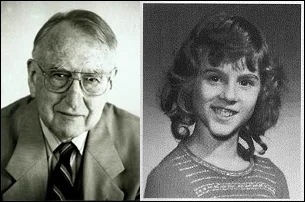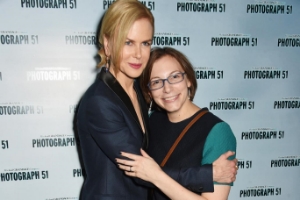Anna Ziegler
by Rich Kelley
On March 10 of this week, the world premiere of Anna Ziegler's new play, BOY, opens as a co-production between Keen Company and The Ensemble Studio Theatre through the EST/Sloan Project, EST's partnership with the Alfred P. Sloan Foundation to develop new plays "exploring the worlds of science and technology." BOY tells the story of a family with twin boys, one of whom suffers a botched circumcision and who is then raised as a girl. We last talked with Anna about BOY when it received a RoughtCut Workshop production as part of the 2014 First Light Festival so we were eager to get caught up.
The story of BOY bears many resemblances to the case of David Reimer, a twin boy born in 1965 in Canada who suffered a botched circumcision and who, at the advice and under the care of psychologist John Money, was raised as a girl. How much did that incident inform your writing of BOY?
The story of David Reimer was certainly the inspiration for my play. It gave me a very general framework – boy loses penis, boy is raised as a girl, boy learns what happened to him and returns, at age fifteen, to being a boy. I set the play during the same time frame as the Reimer story because it is also a chronicle of where science was during those years—if the play were set now, for instance, no one would believe that such a decision could be made, and indeed, it likely wouldn’t. But the play departs quite radically from Reimer’s story in almost all other respects. For instance, the John Money/David Reimer story seemed to lack the particular angle in which I was most interested – a story in which love is the blinding force, as opposed to greed or ambition or cruelty. I wasn’t interested in writing a story about a villain and a victim, but in exploring the complicated terrain of mutual need, love and dependence between doctor and patient, and the problems that arise when someone is desperate to see an experiment succeed.
John Money; David Reimer
In another interview you mentioned that “betrayal and forgiveness and the durability of love” are recurrent themes in your plays. Is this true in BOY?
Ha ha. That might have been my way of not answering that question! I mean, one would be hard pressed to find a play that doesn’t involve at least some of those things. But having said that, I think those themes play a huge role in BOY too. At the heart of the play is an incredible betrayal, stunning in its scope and consequences. That Adam can ultimately find a way to forgive his parents speaks to his gradual recognition that it was in fact love that drove their decision, and to all the characters’ deep humanity and good intentions, however flawed.
We last spoke about BOY when it had a workshop production at EST as part of the 2014 First Light Festival. This week it gets its world premiere in a co-production between EST and Keen Company at the Clurman Theatre at Theatre Row on 42nd Street. How has the play changed over these two years?
It's changed quite drastically, actually. I've shifted the order of scenes, rewritten huge sections, and rethought a central character's ethos. Basically, I can't stop working on this play. But hopefully (especially for the actors' sake), I'll take a break soon enough.
Bobby Steggert in BOY (Photo: Zack DeZon)
If I have the chronology right, you had your first child around the same time you were writing BOY. How did becoming a mother for the first time inform your writing?
You’re right! My son Elliot was born in June, 2013, right smack in the middle of my time with BOY. So I had already done many drafts of the play by the time I became a mom, but when I continued to work on it, my perspective shifted. Unsurprisingly, I related much more to the parents in the play, and their position came to seem all the more heartbreaking. There’s a moment that’s actually no longer in the play when the doctor, Wendell, who’s been nursing resentment towards his own mother (who’s also no longer in the play), realizes that he has failed his patient, a patient he thought of as his own child, and he says, “I never forgave her – my mother. I thought one had to work hard to truly fail a child. I thought it was painstaking, deliberate work.” This idea keeps coming back to me these days. How blinded by love we can be to the real needs of our children.
There are quite a few literary references in the play – to Frankenstein, Jane Eyre, Milton’s Paradise Lost, Leigh Hunt. Are you saying as much about literature in the play as you are about science?
Oh gosh, I think you’re my ideal reader! You caught all my references. And who knows? Maybe subconsciously I’m trying to say something about literature’s limitations being comparable to science’s. Or maybe I’m just dusting off the old English degree and putting it to some use for once – when else can I show off that I read those books? But from a practical standpoint, many of those texts appear in the play because the act of reading connects two of the characters – the child, Samantha, and the doctor, Wendell. Books become incredibly important to Samantha’s growing – and changing – sense of herself. Frankenstein, Paradise Lost and Jane Eyre are also so much about freedom and captivity, creators and their creations, and man’s overreaching, that they felt appropriate to the play.
Nicole Kidman and Anna Ziegler
Much has happened to Anna Ziegler in the past two years. Your play A Delicate Ship had its world premiere at Cincinnati Playhouse in the Park in 2014 followed by an acclaimed run at Playwrights Realm in New York City, during which you were interviewed in the Times. Last fall your play Photograph 51, about Rosalind Franklin and her role in the discovery of the structure of DNA, had a spectacular production in London starring Nicole Kidman as Franklin. In fact, last November Kidman won the Evening Standard Award for Best Actress for this role, and then last month won the WhatsOnStage award. Better yet, Photograph 51 won the WhatsOnStage award for Best New Play! And another of your plays, The Last Match, is garnering stellar reviews in its current run at The Old Globe in San Diego. Isn't this dizzying? How do you keep up with yourself?
It has been a busy time. The nicest part of it has been feeling in a more consistent way that I'm a real playwright, and having something to say when people ask what I'm working on, or whether they can see my work anytime soon. The downside has been not having the time to appreciate things, because all of it is just so stressful in the moment, and when you move right onto the next thing you don't have a second to be relieved and to enjoy the production that just opened.
You’ve now had so many productions in so many different venues. I wonder what distinguishing features you've discovered in how the various companies approach producing plays?
I'd say I've been struck more by the similarities than the differences. At almost every theater where I've worked huge emphasis is placed on supporting the playwright and trying to accommodate her process. I've found that big regional theaters are really tight ships – organized and efficient and professional (at The Old Globe, for instance, even the rehearsal room was stocked with healthy snacks at all times). What comes with those generous budgets are photo shoots and donor events and a bit of razzle-dazzle that you don't necessarily find at smaller NYC theaters. But smaller theaters engender an intimacy between artists, a sense that everyone is in this together and pulling for the same thing. Of course you can find that camaraderie at big theaters too, but when you're putting on a play for 100 people a night (for very little money) you just know that everyone is truly committed to the project, and that makes for something special.
When did you first become interested in science? In playwriting? Which came first?
Kristen Bush as Rosalind Franklin in EST production of Photograph 51
Playwriting definitely came first! As mentioned above, I was an English major – your classic kinda scared-of-science writer. I regularly cried in math class in middle school. It was only when I was commissioned to write a play about a group of female scientists, and began to research Rosalind Franklin in particular, that I became more interested than I was daunted. When I was working on Photograph 51, I had the probably-obvious-to-most revelation that science is driven by people and personalities as much as any field is, and that changed the way I looked at the entire endeavor of science – and of writing plays about it.
Yes, we should probably mention that Photograph 51 was the widely acclaimed EST/Sloan Mainstage Production in 2010 and has received many productions around the world since. Besides BOY and Photograph 51, what other plays have you written that have a scientific component?
None, really. I did write a couple drafts of a play about Heinrich Schliemann, the businessman-turned-archeologist who believed so deeply in the truth of Homer’s stories that he made it his life’s work to find the real Troy. This was also a Sloan commission, but it turned out not to involve very much science (and maybe not very much drama either) so I didn’t pursue it further.
Bobby Steggert and Paul Niebanck in BOY (Photo: Carol Rosegg)
What’s next for Anna Ziegler?
After BOY opens, I'm off to City Theatre in Pittsburgh for the second production of my play The Last Match. It's such a gift to be able to work on it out of town in these two back to back productions at awesome theaters (the first being at the Old Globe, which is running now). In June/July, Theater J in DC is producing my play Another Way Home. And then who knows what next season will bring. It's a bit too soon to say . . .
BOY opens on March 10 and will run through April 9 at the Clurman Theatre at Theatre Row.








